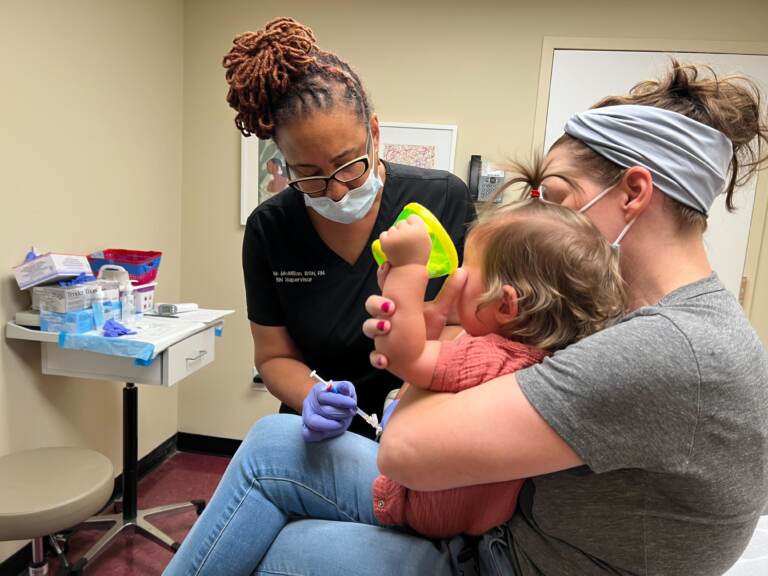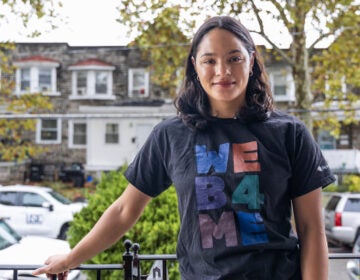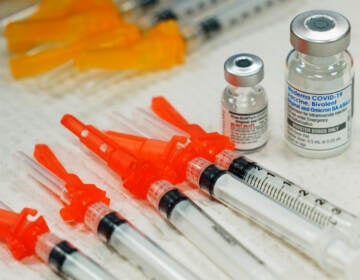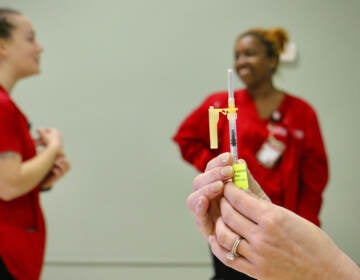Philadelphia-area health experts see shift in attitudes on vaccination in ‘post-COVID’ era
Misinformation, distrust in medical providers, politics and experiences during the height of COVID are playing into people’s views of vaccination, experts say.
Listen 7:44
Sarah Greenberg holds her daughter, 14-month-old Gemma, as she gets her first COVID-19 shot at a clinic organized by the Black Doctors Consortium in late June 2022, at the Dr. Ala Standford Center for Health Equity in North Philadelphia. (Zoe Read/WHYY)
From Philly and the Pa. suburbs to South Jersey and Delaware, what would you like WHYY News to cover? Let us know!
Philadelphia parents Kate Springer and Chris Gladd waited in an exam room at Advocare Fairmount Pediatrics with their 6-month-old son, Oliver, whose gaze was fixed on fish painted on the wall.
Pediatrician Dr. Alexis Lieberman walked in, greeted the family and quickly got to discussing Oliver’s motor skills, language development and sleeping and eating habits. She then moved on to the childhood vaccination schedule.
“So, we have the Hep B, the rotavirus,” Lieberman said as she listed shots for which Oliver was due. “This is a combo vaccine that has DTaP, polio, Hib, Hep B all in one, so that it has saved him a lot of needles.”
Springer and Gladd had decided that Oliver would also get vaccinated for COVID-19 and the flu.
“I think that’s an excellent decision that you’re making to give those to him,” Lieberman said. “It doesn’t keep you from getting those diseases, but it does keep you from getting a bad case, and that’s what we care about the most.”
Soon, Oliver was being held by his parents while a nurse administered a liquid oral vaccine into his mouth, and then one shot in his right leg and another in his left.
“Ok buddy, it’s going to pinch for a minute,” Springer said as she tried to reassure her son, who started to cry after the first shot, but he quickly quieted down with a bottle after it was all over.
As they all headed home, another appointment was already on the calendar for Oliver’s second COVID vaccine.
This scenario plays out every day in pediatricians’ offices, but these days, there can be a lot more discussions happening in the room before any shots are administered.
Vaccines became a hot button issue during the height of the COVID-19 pandemic — a polarizing point of contention between neighbors, family members and coworkers. And now, it appears that anti-vaccine sentiments have spilled over to all kinds of immunizations, including those required for kids to attend school.
This attitude shift around vaccines following the pandemic has left health providers and public health experts with some new and exacerbated challenges in getting people to accept vaccines.
“Some people came out of the COVID experience thinking like, ‘Thank God for vaccines, yay. I will stand on the barricades to make this happen for folks,’” said Alison Buttenheim, a professor of nursing and health policy at the University of Pennsylvania. “And some people are the opposite.”
Buttenheim studies how beliefs, misinformation, communication, state legislation and policy shape the way people perceive vaccines.
A Kaiser Family Foundation report released last September showed that politics and partisanship continue to play a key role in how people view vaccines for COVID, the flu and respiratory syncytial virus.
Survey data also found that 68% of all adults and 55% of parents said measles, mumps and rubella vaccines should be required for healthy children in order to attend school. However, about one-third of adults and 43% of parents said that parents should be able to decide to not vaccinate their children, “even if that may create health risks for others.”
Buttenheim said the vast majority of people in the U.S. get immunized for diseases like measles, polio and meningitis in childhood, as it is a required condition to attend public school.
COVID-19 vaccines, however, are optional in many situations. Buttenheim said that’s caused more parents and families to think about all vaccines as an à la carte menu, where they can pick and choose individual shots.
“A lot of parents were just like, ‘When I weigh the cost and benefit, it’s not worth it. And, oh, if I’m weighing the cost and benefit of the COVID vaccine, maybe I should do that for chickenpox, the varicella vaccine, maybe that’s one to skip. Or MMR, we really don’t have that much measles,’” she said. “That sort of pick and choose, choose your own adventure approach, it was there before and parents were making these tailored, customized, bespoke vaccination schedules, but there’s more of that now.”
Growing and persistent misinformation online and on social media is also playing into people’s decisions, hesitancy and skepticism around vaccines, said pediatrician Dr. Paul Offit, director of the Vaccine Education Center at Children’s Hospital of Philadelphia.
“People will say, ‘I’ve done my research and I’ve decided not to get this vaccine,’ but what does research really mean?” Offit said. “Research really means just looking at other people’s opinions on the internet.”
Offit said false narratives around vaccinations, or bungled and confusing guidance on them as was seen with the COVID shots, have caused some distrust in medical providers and have led to patients questioning their advice.
“Try that message in the 21st century: ‘Trust us, we’re experts.’ Doesn’t work,” Offit said.
While the COVID-19 vaccines were a success in terms of coming to market quickly and preventing serious illness, Offit said efforts to mandate these shots in health care settings, workplaces and various other situations somewhat backfired.
“It was just seen as another example of government overreach, and they pushed back,” he said. “And now, legislatively, there’s been pushback.”
Some states are trying to push legislation that bans any COVID-19 vaccine mandates. Buttenheim said some want to take it a step further and weaken or eliminate childhood school vaccination requirements.
“That’s a big scary thing,” Buttenheim said. “Our school entry mandates for childhood vaccines are why we don’t have high rates of measles, pertussis, why polio was eliminated.”
Other states have moved in the opposite direction in order to increase vaccination coverage and compliance. In recent years, New York and Connecticut eliminated personal and religious, or nonmedical, exemptions that families had previously been able to use to opt out of all or certain school-mandated shots.
Buttenheim said there’s a lot of research and work being done to figure out how to better address people’s concerns around vaccines for themselves and their children, and how to tailor messaging in the exam room or doctor’s office.
“Even just framing vaccination as like, this is the default, this is the office policy, this is what we do,” she said. “You don’t say, ‘Ok, it’s time to talk about vaccines, are you OK with the MMR?’ You’re just like, ‘Baby is due for five shots today, the nurse is going to come in and the next thing we’re going to do is give the baby vaccines.’ And then if you get pushback, then that’s a signal that like, OK, we need to pivot here.”
For now, immunization rates and protection against diseases like measles, mumps and rubella remain high in states like Pennsylvania, despite incrementally dropping in recent years.
Health experts say they have their work cut out for them in terms of being creative and finding new ways to communicate the benefits of vaccines and the consequences of weakened herd immunity, and to get at the root of people’s belief systems around shots.
“We need to understand how it influences decision making and we need to understand how to counter it,” said Buttenheim.

Get daily updates from WHYY News!
WHYY is your source for fact-based, in-depth journalism and information. As a nonprofit organization, we rely on financial support from readers like you. Please give today.



![CoronavirusPandemic_1024x512[1]](https://whyy.org/wp-content/uploads/2020/03/CoronavirusPandemic_1024x5121-300x150.jpg)



